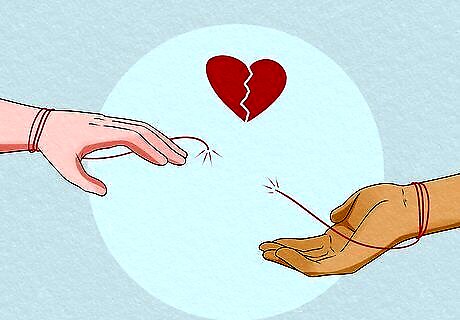
views
- Identify the triggers that tempt you to cheat to break your cycles.
- Avoid flirting with people you find attractive so you can prevent an affair.
- Use self-reflection and therapy to understand your patterns of infidelity.
- Communicate openly with your partner and commit to remaining faithful.
Examine the root cause of your infidelity.

Admit to yourself why you cheat to find your triggers. Self reflect and pay close attention to the motivations and impulses behind your behavior. Are you looking for approval or validation? Do you want thrill or excitement? Maybe you're craving independence or freedom. Whatever the case is, remaining honest with yourself will help you pinpoint why you've stepped outside your relationship. Also consider your state of mind. Have you been stressed or depressed? Think about your need for stimulation. Do you find yourself bored? Identify your love language. Are you lonely or touch-starved?
Resist blaming your SO for your behavior.

Acknowledge you're responsible for an affair so you can move forward. Accept blame when you deserve it and be accountable. Even if you craved company or passion, focus on how you chose to seek that out from someone else instead of your partner. When you come to terms with your betrayal, it will be easier to admit to cheating on a loved one. Plus, they're more likely to forgive you if you take ownership for your actions. It may be easier to continue with affairs if you feel they're "out of your control." You'll also avoid re-traumatizing a partner if you don't shift blame to them. Your partner may experience shame if they learn about an affair, so it's best to minimize as much hurt as you can. Your significant other may have renewed respect for you if you accept your wrongdoing.
Visualize your ideal relationship.

Be clear about what you crave so you don't look for it elsewhere. Think about what gives you the "cheater's high"—the rush that comes from infidelity—and consider how you can get that same excitement from a relationship. To find out what you want from a relationship, list out your needs and visualize a dynamic that would satisfy you. When you're specific, you may find that all your desires can be met in a committed partnership. Is it important for you to make sex important in a relationship? Do you want to be heard and be able to communicate effectively? Would you like your partner to be more affectionate? Are you hoping to be independent in a relationship?
Reflect on whether you want monogamy.

Be honest with yourself about the relationship style you can stick to. Seriously consider if you want just one partner and plan to remain in a committed partnership. If that type of lifestyle doesn't resonate with you, then spend time learning about what a polyamorous relationship is. Weigh the pros and cons of either a closed or an open relationship. Once you recognize which dynamic you prefer, it will be easier to carry yourself with honesty and integrity. If you've decided monogamy is your ideal, then remember affairs are off-limits. If you plan to have an open relationship, then you need your partner's consent first. Even if polyamory or ethical non-monogamy would work better for you, make sure you date people who want this dynamic and don't continue to hide relationships.
Remove any temptations to cheat.

Avoid risky situations so you have an easier time remaining faithful. The after-party at a work conference away from home may sound like fun, but it's a recipe for disaster if you know you're prone to cheating. If you've committed to stop cheating, then you can prevent most slip-ups by simply avoiding common situations for cheating: Parties without your partner, especially where alcohol is involved. Solo trips, such as business conferences or trade shows. Hanging out with single friends who are constantly looking for dates. Following people you’re attracted to on social media like Instagram. Flirting, sexting, or DMing anyone as a “fun distraction.” Keeping in touch with anyone you share a romantic history with.
Replace flings with hobbies.

Keep yourself too busy to cheat and find other ways to blow off steam. Find a new hobby you can enjoy solo to give yourself a safe outlet for self-expression that doesn't involve infidelity. Whatever you do, avoid replacing your free time with more stress or work. Cheating is often a way to relieve stress and tension, so find a new way to relax. Fill the hours with an activity you enjoy and the temptation to cheat will likely fade. Consider the benefit of swapping a toxic behavioral pattern for a positive hobby that supports your self-growth. Example: Flirting with my ex will only make me feel guilty and hurt my partner, while painting will help me release all my emotions. Plus, I can surprise my sweetheart with a new art piece!
End all your affairs.

Cut off contact with any affair partners to mend your relationship. Even though it's hard, make the brave choice to stop an affair and prioritize your partner. Avoid all forms of communication with anyone who's been part of your infidelity—that includes in-person meet-ups as well as texts and DMs. Tell your affair partners you're going "no contact" so you don't have the opportunity to be unfaithful. If you think your affair partner will try to talk you out of leaving, it's okay to stop communication and block them without letting them know in advance. End an emotional affair, too. Even if you're just venting to someone you slept with or are attracted to, your partner probably wouldn't be happy with that.
Try therapy to discuss your patterns.

Seek help from a professional to learn how to break a cycle of affairs. Before you discuss your infidelity with your partner, book a session with a counselor who specializes in relationship psychology. Talk to this expert about how to identify your attachment style, get over any possible fear of commitment, and build a healthy relationship. The self-awareness you gain from therapy may be key to overcoming the desire to cheat. Discuss whether you routinely cheat or if it's unusual for you. Open up about stressful situations like work or tension at home. Share your goals for a more functional relationship. Ask how to bring up your infidelity to your partner.
Decide on the “end game” you want for your love life.

See if you intend to rebuild your relationship or if it's better to let go. Consider whether you can seriously commit to your partner—maybe you've decided that you'd like to come clean and make amends. Then again, you might believe it's best to end your relationship so both of you can move on and grow separately. When you've decided on what feels authentic and compassionate, you can have a more productive conversation with the person you cheated on. Think about your "why" if you hope to remain together—are you just anxious to be alone, or are you genuinely willing to work to regain your partner's trust? Remember that your partner might not wait to stay with you even if you'd like to repair the relationship. Take into account both your and your partner's well-being when you consider a split. Even if you made a mistake, both of you deserve to be happy.
Practice open communication with your partner.

Be transparent and prioritize active listening to support your SO. When you're ready to come clean about your infidelity, make sure to be completely upfront. Share all relevant details so your partner has the full story. If they interrupt you or ask for clarification, remain calm and understanding. Finally, actively listen to them and show empathy for how they've been impacted. Be prepared for an intense talk. Your partner may not be willing to forgive you right away. Make sure not to defend yourself or minimize your significant other's emotions. Ask your partner how you can support them after your conversation. They might want to be held, but they might also want to be left alone.
Set boundaries and expectations.

Have a conversation on what does or does not constitute cheating. If you drunkenly kiss a college friend, does your partner want to know about it? Is flirting or buying a drink for someone at a conference over the line, or do you trust each other to limit flirting to harmless banter? Even though this conversation isn't the easiest one to have, it’s important to discuss what’s off-limits. Once you’re clear about what your partner expects, make a pact with yourself to honor their boundaries. When you establish boundaries, it may help to understand your partner's reasoning behind them. For example, they might feel uncomfortable with a certain ex because they've watched you flirt with them before. The more openly and often you talk about what's acceptable together, the easier it will be to navigate social dynamics and respect your partner.
Recreate the magic from your first dates.

Reboot your relationship and rebuild rapport to heal from an affair. If your partner is willing to give your connection another shot, make it worth their while! Think back to your first dates and put real effort into being romantic all over again. Aim for a mix of low-key outings, like movies, and breathtaking experiences, like whirlwind trips. Your SO may begin to move past your infidelity when they see how bright their future is with you. You may find that it's really exciting to pursue your partner just like you did in the beginning of your relationship. You might also rediscover how much you adore your significant other when you take them out on dates again. When you are more mindful about quality time, you may realize that's all you really needed in your connection.
Add the “fire” back to your dynamic.

Seduce your SO so you fantasize about them instead of other people. If you've been together for a while, then focus on how to enjoy sex in a long-term relationship. First, check in and see if your partner is in the right head space for intimacy. If they are, then focus on their pleasure and ask how they'd like to mix things up. When you're both on the same page, you may experience a whole new level of passion. Ask if your partner needs more tenderness and to take things slow. They might need some reassurance after your affair. Discuss fantasies neither of you have tried together before. Try to give your SO an incredible experience. For example, make a hotel room romantic on your anniversary.
Make room for novelty and surprises.

Keep your relationship spontaneous so it always feels fresh. Think about the honeymoon phase of your dynamic and what made it so exciting. Were you both really curious about the world? Maybe you loved to be really goofy. Then again, you might've been a super sporty couple. Whatever the case is, plan fun activities that your SO would get a kick out of. Your creativity may pay off and help you both feel like you've turned back the clock to your best times together. Keep each other guessing! When neither of you know what to expect, you'll feel like there's always more to explore together. Make sure to laugh as often as you can. It'll relieve stress and raise dopamine, one of the love hormones that can keep you both crushing on each other for years to come. Mix up hobbies and intimacy to enjoy all the novelty that a long-term relationship has to offer.
Be sensitive to your partner’s needs.

Stay emotionally available when your SO is hurting to rebuild trust. Even if you both patch everything up, your partner may struggle with triggers or trauma from your infidelity. Whenever this happens, reassure them that you're always willing to talk. Ask how you can support them and follow through with your promises to create a sense of emotional safety. Understand that your partner's grief over infidelity may come in waves. Recovery from infidelity may take longer than you both expect. Patience and compassion helps with the healing process. Maintain complete transparency, like sharing your schedule with your SO. Reader Poll: We asked 279 wikiHow readers who’ve cheated, and 60% of them agreed the biggest challenge in rebuilding trust is dealing with the emotional fallout and broken trust. [Take Poll]
Give your SO space to heal.

Accept that your partner may need to step away to process your affair. They might need to take a break or have time to themselves to sort through all their emotions. After they've assessed your infidelity, they may decide that the only way to get over the hurt is to move on. Whatever their choice is, gracefully respect it. Embrace what you've learned about yourself and relationships, then apply that to your love life in the future. If your partner is interested in continuing to see you, focus on healing your relationship after your affair. Learn to be alone after a breakup if your SO decides it's in their best interest to heal on their own.


















Comments
0 comment